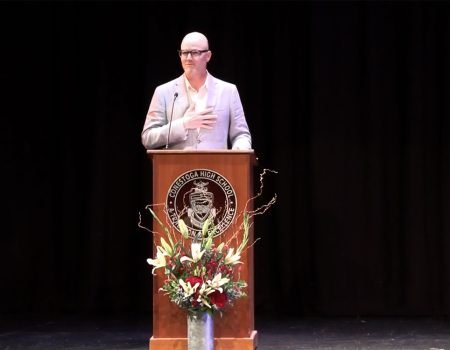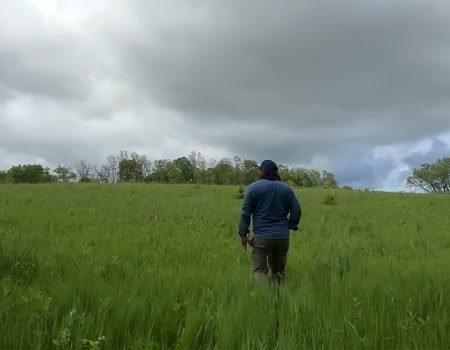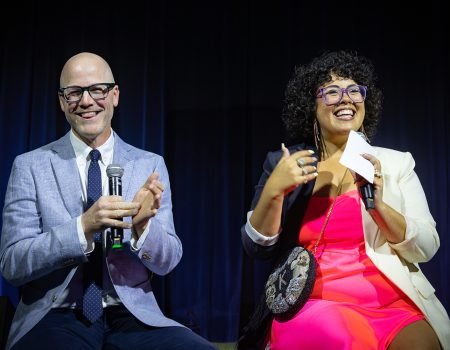On Hollywood (Boulevard, That Is)
The last conference I attended was the 1987 Pennsylvania Association of Student Council Conference in Altoona. I gave a presentation on managing the social pressures that come with student leaderhsip. That’s a long way from talking Web 2.0 across the street from Mann’s Chinese Theater.
I flew into Los Angeles this afternoon for the Always On’s OnHollywood Conference. Given The Network of Fun‘s recent success rate with all things digital, my interest in growing my leadership role there, and the overall pace of technological change, I thought it might be a good idea to sit through a few of these keynotes and panels.
So tonight found me at the historic Hollywood Roosevelt Hotel listening to moderator Carson Daly (my former colleague, in theory anyway; I once complimented him on a solid Grammy post-show as we rode the escalator out of the office) interview some new media heavyweights: You Tube’s Chad Hurley, MP3tunes (formerly MP3.com founder) Michael Robertson, Sling Media’s Blake Krikorian, and Demand Media (and My Space player) Richard Rosenblatt.
The venue, of course, was chosen wisely. The Hollywood Roosevelt Hotel was founded in 1927 by a syndicate of Hollywood luminaries that included Mary Pickford, Douglas Fairbanks, and Louis B. Mayer. The hotel’s “Blossom Room” — our conference homebase — hosted the first-ever Academy Awards ceremony, on May 19, 1929. Mann’s Chinese and El Capitan are just down the street. And (get this) TV Guide’s headquarters are next door. (Can you imagine TV Guide in a time-shifted, search-oriented future? Me neither.)
Always On founder Tony Perkins kicked off the evening. He showed a brief video in which a tweener said, “TV is going down,” which drew laughter. Another pre-teen girl was agast when told that some television network executives don’t want her to be able to watch their shows on her iPod. “Ooooh!” she said.
The stat that dazzled me, though, was that 62% of video that teenagers view online was created by someone they know. Which is to say, not MTV. Or NBC.
Wow.
Another great soundbite to hit the PowerPoint came from good ole Rupert Murdoch — he of the$580M My Space acquisition — way back in 2005.
What is happening is, in short, a revolution in the way young people are accessing news. They don’t want to rely on the morning paper for their up-to-date information. They don’t want to rely on a god-like figure from above to tell them what s important. And to carry the religion analogy a bit further, they certainly don’t want news presented as gospel.
Amen, sir.
So, after debuting their new venture, Dot TV (basically, a site that enables users to aggregate their favorite online video with their own customizable domain), Daly and Rosenblatt invited the others onstage.
It was a DudeFest onstage (and off), to be sure. Still, the guys had plenty of ideas (and dollars) between ’em. The discussed ad models, and monetizing UGC, and unleashing network archives. The talked LonelyGirl15, optimal online clip length (two minutes, according to Hurley), and the ongoing value of the water cooler.
Blake Krikorkian warned that “Every day [television networks] don’t embrace [online video] … they’re giving up ground to this huge tidal wave of incredible producers who are creating their own content.”
Chad Hurley said You Tube’s pushing into mobile instead of TV. It where his audience is, he says. Plus, You Tube video “looks better when its shrunken down.”
Michael Roberts prognosticated that the coming year would see a “continung battle over DRM [digital rights management] if you want to get to a world where you can watch your video anywhere.”
Richard Rosenblatt foresaw big media getting “more aggressive, users getting more focussed on their own space, the web getting more verticle.” In short, he said, “Just a lot more, a lot bigger.”
The funny part, though, was that the Always On team thought it would be a good idea to a) webcast the event and b) feed a chatroom about the event on a huge screen behind the panelists. So while Krikorkian was suggesting that network executives have to “allow cannibalistic growth to happen,” audience members were giggling at all the attention justin.tv (who was — meta upon meta — sitting in the second row) was getting over his shoulder.
None of it was terribly earth shattering (but then, the panel was titled “How the Rules Changed: One Year Later,” so we’ll cut ’em some slack). Perhaps due to our demographic and how hard I’ve been working to understand and address the changing digital landscape, not to mention my experience as an artist who gets paid thanks to online distribution, it all felt pretty familiar. Still, I was happy to be near the conversation, if not in it.
Moreover, it made me think about Chris and my “Mister Rogers & Me” documentary. Why bother with Sundance or HBO? Am I, in fact, the last of the Big Media Dinosaurs? Or the first of a newly evolved species? Was Patti Smith right when she sang, “People have the power?” Do we? Do I? Can I leverage my knowledge of content creation, marketing and distribution to be a rock ‘n roll, online Ernie Pyle (as I’ve dreamt since I was seventeen-years-old)? Maybe. Maybe not.



